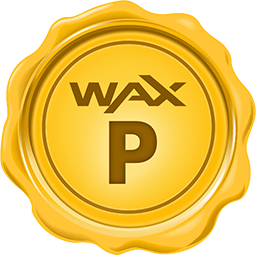-
 Bitcoin
Bitcoin $85,241.9855
0.76% -
 Ethereum
Ethereum $1,597.0257
0.52% -
 Tether USDt
Tether USDt $0.9994
-0.05% -
 XRP
XRP $2.0813
0.09% -
 BNB
BNB $590.8186
-0.10% -
 Solana
Solana $138.8687
3.49% -
 USDC
USDC $0.9997
-0.01% -
 Dogecoin
Dogecoin $0.1581
1.70% -
 TRON
TRON $0.2425
-0.85% -
 Cardano
Cardano $0.6270
1.80% -
 UNUS SED LEO
UNUS SED LEO $9.3414
2.15% -
 Chainlink
Chainlink $12.7688
1.17% -
 Avalanche
Avalanche $19.5247
2.22% -
 Stellar
Stellar $0.2463
0.89% -
 Toncoin
Toncoin $2.9696
-0.86% -
 Shiba Inu
Shiba Inu $0.0...01220
1.48% -
 Hedera
Hedera $0.1659
0.03% -
 Sui
Sui $2.1398
0.53% -
 Bitcoin Cash
Bitcoin Cash $337.5386
1.43% -
 Hyperliquid
Hyperliquid $17.9149
7.71% -
 Polkadot
Polkadot $3.7371
0.29% -
 Litecoin
Litecoin $76.0076
0.32% -
 Dai
Dai $0.9998
-0.01% -
 Bitget Token
Bitget Token $4.4680
2.24% -
 Ethena USDe
Ethena USDe $0.9991
0.00% -
 Pi
Pi $0.6477
3.98% -
 Monero
Monero $214.7885
-2.24% -
 Uniswap
Uniswap $5.2466
0.85% -
 OKB
OKB $50.8708
1.47% -
 Pepe
Pepe $0.0...07202
0.85%
What are the application scenarios of blockchain?
Blockchain's decentralized nature enables secure transactions across diverse sectors, from cryptocurrencies and DeFi to supply chain management, digital identity, and healthcare, despite scalability and regulatory challenges.
Mar 13, 2025 at 10:00 pm

Key Points:
- Blockchain's decentralized and transparent nature enables secure and efficient transactions across various sectors.
- Cryptocurrencies are the most well-known application, but blockchain technology extends far beyond digital currencies.
- Supply chain management, digital identity verification, voting systems, and healthcare are among the key application areas.
- Challenges remain, including scalability, regulation, and interoperability, but potential benefits are significant.
What are the Application Scenarios of Blockchain?
Blockchain technology, initially conceived as the foundation for cryptocurrencies like Bitcoin, possesses a far broader range of potential applications. Its core features – decentralization, transparency, immutability, and security – make it suitable for various industries grappling with trust and efficiency issues. Let's explore some key application scenarios.
Cryptocurrencies and Decentralized Finance (DeFi):
This is arguably the most widely known application. Blockchain underpins cryptocurrencies, allowing for peer-to-peer transactions without intermediaries like banks. DeFi leverages blockchain to create decentralized financial services, including lending, borrowing, and trading, offering potentially greater accessibility and transparency than traditional finance. The removal of central authorities introduces new levels of autonomy for users.
Supply Chain Management:
Tracking goods throughout their journey from origin to consumer is a complex task. Blockchain offers a solution by providing an immutable record of each stage, improving transparency and accountability. This enhances traceability, reduces fraud, and improves efficiency by streamlining processes and reducing paperwork. Participants can access real-time information, enhancing trust and collaboration.
Digital Identity and Authentication:
Managing digital identities securely and efficiently is a growing challenge. Blockchain can create secure, verifiable digital identities, reducing reliance on centralized authorities susceptible to hacking or data breaches. This could streamline processes like KYC/AML compliance, passport verification, and online voting. The decentralized nature ensures greater user control over personal data.
Healthcare:
Sharing sensitive patient data securely and efficiently across healthcare providers is crucial. Blockchain can create a secure and transparent system for managing medical records, ensuring data integrity and patient privacy. This enables better patient care by facilitating seamless data sharing among doctors and hospitals, improving treatment outcomes. It also reduces the risk of data breaches and medical errors.
Voting Systems:
Traditional voting systems are susceptible to fraud and manipulation. Blockchain can enhance the security and transparency of elections by providing an immutable record of votes. This makes it harder to tamper with results and increases voter confidence in the integrity of the process. However, implementation requires careful consideration of accessibility and usability.
Intellectual Property Rights Management:
Protecting intellectual property is critical for creators and businesses. Blockchain can provide a secure and transparent system for registering and managing intellectual property rights, making it easier to prove ownership and prevent infringement. This offers a more efficient and reliable system than traditional methods, reducing disputes and legal costs.
Gaming and NFTs:
Non-Fungible Tokens (NFTs) are digital assets uniquely identifiable on a blockchain. They are revolutionizing the gaming industry by allowing players to own and trade in-game items, creating new economic opportunities. This provides greater player control and fosters more engaging and interactive gaming experiences. Blockchain's security ensures the authenticity and ownership of these digital assets.
Challenges and Considerations:
While the potential applications of blockchain are vast, challenges remain. Scalability remains a significant hurdle for some blockchains, limiting their ability to handle large volumes of transactions. Regulatory uncertainty also poses a challenge, with governments still developing frameworks for regulating blockchain technology and cryptocurrencies. Interoperability, or the ability of different blockchains to communicate and exchange data, is also a key area needing further development.
Frequently Asked Questions:
Q: Is blockchain only used for cryptocurrencies?
A: No, while cryptocurrencies are a prominent application, blockchain's potential extends far beyond digital currencies. Its decentralized and secure nature makes it applicable in various sectors, including supply chain management, healthcare, and digital identity.
Q: How secure is blockchain technology?
A: Blockchain's security stems from its decentralized and cryptographic nature. Data is distributed across numerous nodes, making it extremely difficult to alter or delete information without detection. However, the security of specific blockchain implementations can vary depending on design and implementation.
Q: What are the limitations of blockchain?
A: Limitations include scalability issues, the energy consumption of some blockchain networks (particularly proof-of-work systems), regulatory uncertainty, and the need for improved interoperability between different blockchain platforms.
Q: How does blockchain improve transparency?
A: Blockchain's transparency comes from its public and immutable ledger. All transactions are recorded on the blockchain and are accessible to anyone with permission (depending on the blockchain's design), fostering greater accountability and trust.
Q: What is the future of blockchain technology?
A: The future of blockchain is likely to involve further innovation in areas like scalability, interoperability, and regulatory frameworks. Increased adoption across various industries is expected, leading to more widespread applications and integration with existing systems. The evolution of blockchain technology will continue to shape the digital landscape.
Disclaimer:info@kdj.com
The information provided is not trading advice. kdj.com does not assume any responsibility for any investments made based on the information provided in this article. Cryptocurrencies are highly volatile and it is highly recommended that you invest with caution after thorough research!
If you believe that the content used on this website infringes your copyright, please contact us immediately (info@kdj.com) and we will delete it promptly.
- Renowned Author Robert Kiyosaki Forecasts Bitcoin (BTC) Price Could Skyrocket to $1 Million by 2035
- 2025-04-19 19:30:13
- A Modest Investment of $500 Today Could Potentially Grow into $2 Million by 2026
- 2025-04-19 19:30:13
- Bitcoin (BTC) and Ethereum (ETH) Options Expiry Today: Brace for Volatility
- 2025-04-19 19:25:14
- Ethereum Today Reacts To Base Tweet Frenzy
- 2025-04-19 19:25:14
- Michael Saylor's Bitcoin Playbook
- 2025-04-19 19:20:15
- Bitcoin (BTC) and Ethereum (ETH) ETFs Show Divergent Flows As BTC ETFs Gain 1,147 BTC
- 2025-04-19 19:20:15
Related knowledge
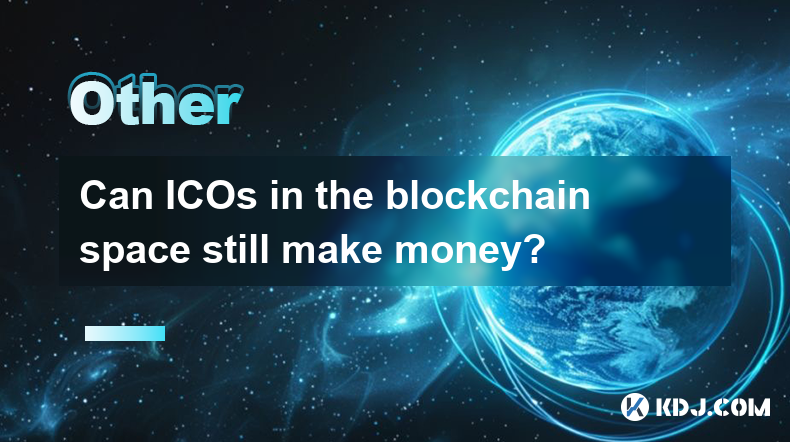
Can ICOs in the blockchain space still make money?
Apr 17,2025 at 08:29pm
The landscape of Initial Coin Offerings (ICOs) in the blockchain space has evolved significantly since their peak in 2017 and 2018. Despite the increased regulatory scrutiny and the rise of alternative fundraising methods like Security Token Offerings (STOs) and Initial Exchange Offerings (IEOs), ICOs can still be a viable way to raise funds and generat...
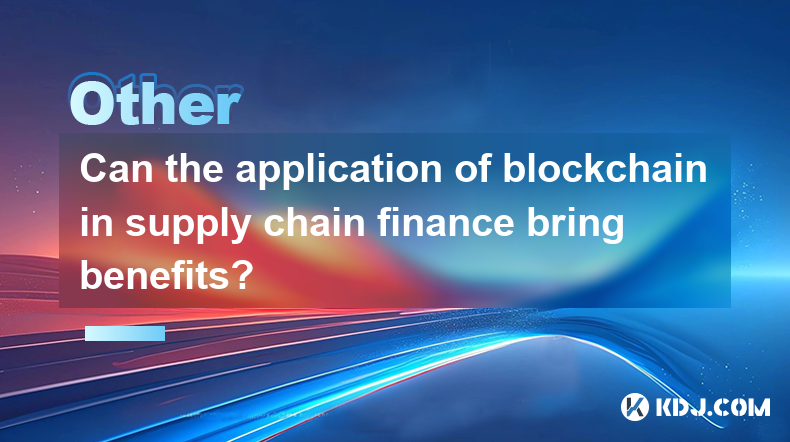
Can the application of blockchain in supply chain finance bring benefits?
Apr 15,2025 at 04:00pm
Can the application of blockchain in supply chain finance bring benefits? The integration of blockchain technology into supply chain finance has garnered significant attention in the cryptocurrency and financial sectors. This article explores how blockchain can potentially revolutionize supply chain finance, detailing its benefits and providing a compre...

Does the ranking of Chinese blockchain apps include cross-chain applications?
Apr 14,2025 at 04:00pm
The ranking of Chinese blockchain apps is a comprehensive evaluation that takes into account various aspects such as user base, transaction volume, and technological innovation. A pertinent question arises regarding whether these rankings include cross-chain applications. Cross-chain applications, which allow different blockchain networks to interact an...
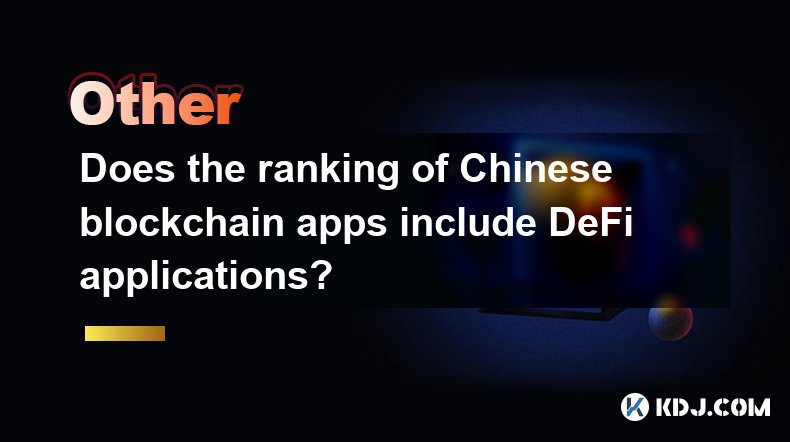
Does the ranking of Chinese blockchain apps include DeFi applications?
Apr 15,2025 at 06:57am
The ranking of Chinese blockchain apps is a comprehensive list that showcases the most popular and influential applications within the cryptocurrency ecosystem. One question that often arises is whether these rankings include DeFi applications. To answer this, we need to delve into the specifics of how these rankings are compiled and what types of appli...
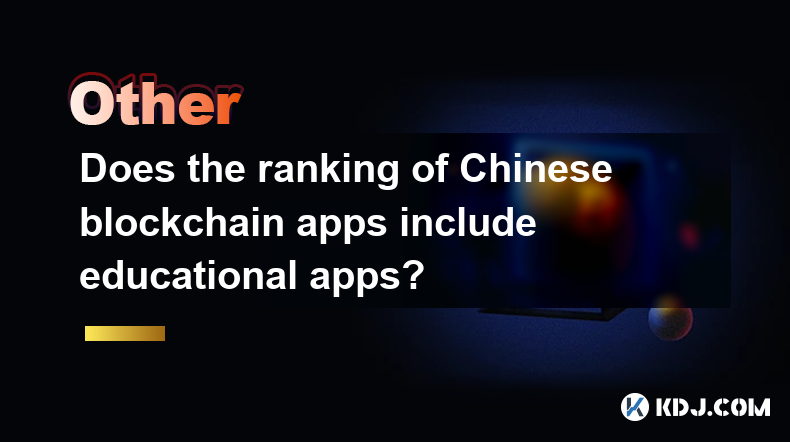
Does the ranking of Chinese blockchain apps include educational apps?
Apr 16,2025 at 03:35am
The ranking of Chinese blockchain apps often includes a variety of categories, from finance and gaming to social networking and beyond. One question that frequently arises is whether these rankings include educational apps. To address this, we need to delve into the specifics of how blockchain apps are categorized and ranked in China, and whether educat...
Does the ranking of Chinese blockchain apps include enterprise-level applications?
Apr 15,2025 at 06:42am
The ranking of Chinese blockchain apps often includes a variety of applications, ranging from consumer-focused to enterprise-level solutions. Understanding the scope and criteria for these rankings is essential to determine if enterprise-level applications are included. This article delves into the specifics of how Chinese blockchain app rankings are co...

Can ICOs in the blockchain space still make money?
Apr 17,2025 at 08:29pm
The landscape of Initial Coin Offerings (ICOs) in the blockchain space has evolved significantly since their peak in 2017 and 2018. Despite the increased regulatory scrutiny and the rise of alternative fundraising methods like Security Token Offerings (STOs) and Initial Exchange Offerings (IEOs), ICOs can still be a viable way to raise funds and generat...

Can the application of blockchain in supply chain finance bring benefits?
Apr 15,2025 at 04:00pm
Can the application of blockchain in supply chain finance bring benefits? The integration of blockchain technology into supply chain finance has garnered significant attention in the cryptocurrency and financial sectors. This article explores how blockchain can potentially revolutionize supply chain finance, detailing its benefits and providing a compre...

Does the ranking of Chinese blockchain apps include cross-chain applications?
Apr 14,2025 at 04:00pm
The ranking of Chinese blockchain apps is a comprehensive evaluation that takes into account various aspects such as user base, transaction volume, and technological innovation. A pertinent question arises regarding whether these rankings include cross-chain applications. Cross-chain applications, which allow different blockchain networks to interact an...

Does the ranking of Chinese blockchain apps include DeFi applications?
Apr 15,2025 at 06:57am
The ranking of Chinese blockchain apps is a comprehensive list that showcases the most popular and influential applications within the cryptocurrency ecosystem. One question that often arises is whether these rankings include DeFi applications. To answer this, we need to delve into the specifics of how these rankings are compiled and what types of appli...

Does the ranking of Chinese blockchain apps include educational apps?
Apr 16,2025 at 03:35am
The ranking of Chinese blockchain apps often includes a variety of categories, from finance and gaming to social networking and beyond. One question that frequently arises is whether these rankings include educational apps. To address this, we need to delve into the specifics of how blockchain apps are categorized and ranked in China, and whether educat...

Does the ranking of Chinese blockchain apps include enterprise-level applications?
Apr 15,2025 at 06:42am
The ranking of Chinese blockchain apps often includes a variety of applications, ranging from consumer-focused to enterprise-level solutions. Understanding the scope and criteria for these rankings is essential to determine if enterprise-level applications are included. This article delves into the specifics of how Chinese blockchain app rankings are co...
See all articles




















































































